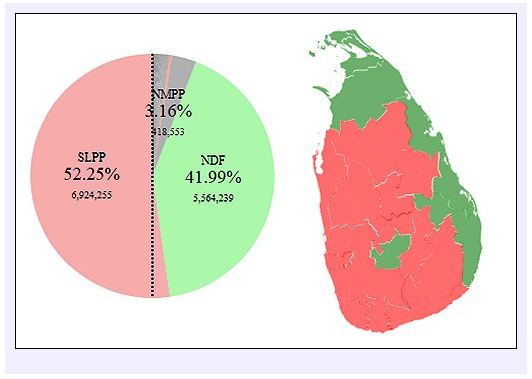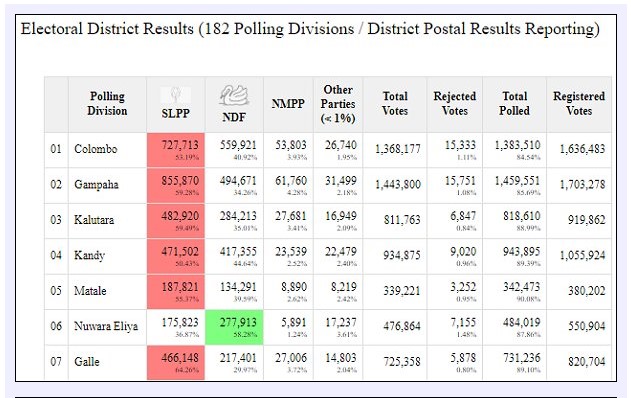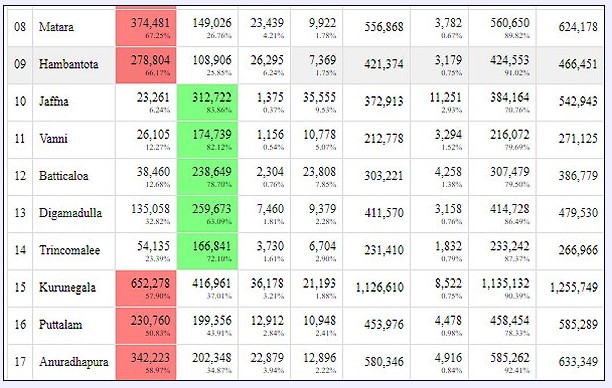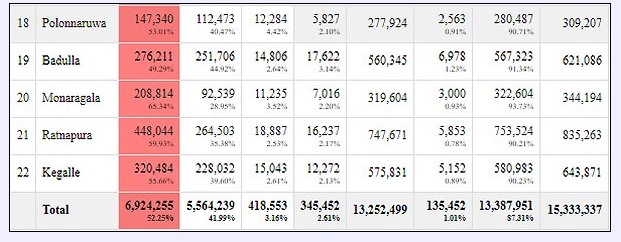Unfolding what we received and what we perceived: Rajapaksa has to ensure more
Posted on November 19th, 2019
S. M. D. P. Harsha Senanayake Researcher- Social Scientists’ Association M.A. International Relations (New Delhi), B.A (Hons.) International Relations (Colombo)
The election had taken place to elect the 7th executive president of Sri Lanka was concluded by marking a decisive victory by Gotabaya Rajapaksa; former defence secretary and brother of former President Mahinda Rajapaksa. Sri Lanka’s former wartime defence secretary Gotabaya Rajapaksa has claimed victory in Presidential election, with over 50 per cent of the votes precisely 52.25% with the total votes of 6, 924, 255. The results manifest as the highest number of votes conceived by a presidential candidate since 1994. Even former President Mahinda Rajapaksa who reappeared for the election in 2009 with immense Sinhala Buddhist sustenance and with the consecration of wast majority of the citizen as the president who terminated the three decades prolong war between Liberation Tigers of Tamil Eelam and the government of Sri Lanka could not able to assertion votes like his brother Gotabaya did in 2019.
Surprisingly, the presiding party candidate Minister Sajith Premadasa represent National Democratic Party conceded the presidential election and congratulated his rival Rajapaksa on his election as the seventh president of Sri Lanka beforehand official confirmations of the victor of the election. However, Sajith Premadasa assertions 41.99% percentage while acquiring 5,564,239 votes in total. In his letter Premadasa thanks all the citizens that vote for him as well as those who worked tirelessly on his campaign. Premadasa noted that this was the most peaceful presidential election in the history of the country, adding that this was the straight result of the democratic improvements and institutional reforms that took place over the past five years.
Premadasa mentioned further and requests Gotabaya Rajapaksa to take the democratic process forward while strengthening and protecting the democratic institutions and values that enabled this peaceful election. He also called on the president-elect to ensure that the post-election environment is peaceful and that no citizen is persecuted for supporting him.
Meanwhile, Rajapaksa who earned a majority votes of the South said his victory should be rejoicing peacefully as Sri Lankans. As we usher in a new journey for Sri Lanka, we must remember that all Sri Lankans are part of this journey. Let us rejoice peacefully, with dignity and discipline in the same manner in which we campaigned, the President-elect said. However, with the lessons drew from the election results stress that Gotabaya has to ensure further to unite the nation and position as a Sri Lankan since more than 90 per cent of votes from North, North East, Digamadulla and Nuwara Eliya entail by wast majority of Tamils and Muslims and other minorities of country voted in favour of Sajith Premadasa, and Rajapaksa was clever to triumph bearly 5- 6% from these respective areas. This sound strange, however, the long-time political turbulences and the political campaigned commanded by Rajapaksa family embrace the Sinhala Buddhist sentiments and spread discontent and anxiety within the mentalities of individuals who are not adequate into the conventional socio-economic-political culture and religious outfit. The two political fronts Podujana Eksath Peramuna and National Democratic Front represented two ideological camps and conceded varieties of supporters epitomize diverse and competitive political ideologies. Major Tamil and Muslim political parties including All Ceylon Makkal Congress, Jathika Hela Urumaya, Sri Lanka Muslim Congress, Tamil Progressive Alliance, Democratic People’s Front, National Union of Workers, Uo- Country aggregate under the superior umbrella of NDF and TNA- decided to support NDF candidate Sajith Premadasa during the presidential election. Since 2005 Mahinda Rajapaksa regime embraces the inkling of Sinhala Buddhist Nationalism and cited Sri Lanka as a Sinhala Buddhist country, predominantly those who congregated with Mahinda Rajapaksa regime after 2009 systematically spread the idea of Sinhala Buddhist nationalism over the country while producing faultlines between majority and minority groups. Organisations emerge during post-civil war Sri Lanka comprising Bodu Bala Sena (BBS) and Sinhala Rawaya touch the nerves of Sinhala Buddhist mentality to acknowledge and adoration Rajapaksa as the prime saviour of the Sinhala Buddhist Nationalism since all major Tamil and Muslim political parties gathered with NDF.
The political front constructed around the pivotal point of Rajapaksa family consists of Ceylon Workers’ Congress, Eelam People’s Democratic Party, Jathika Nidahas Peramuna, National Congress, Mahajana Nidahas Peramua, Socialist Alliance, Communist Party of Sri Lanka, Democratic Left Front, Desha Vimukthi Janatha Pakshaya, Lanka Sama Samaja Pakshaya, Sri Lanka Mahajana Pakshaya and Tamil Makkal Viduthalai Pulikal while Sri Lanka Freedom Party decided to hold hands with Gotabaya Rajapaksa during the presidential election. The political map and the voters’ behaviour in the election indicate this diverse and the ethnic divisions custom on the nationalism and religionism. Particularly, Nothern and North East voted for the Premadasa to secure multiculturalism and embrace equality and justice since the Rajapaksa family and its supporters exercise Sinhala Buddhist sentiments to eradicate voices of minorities and exclude them from the national political debate. The Yapahalana (Good Governance) regime has done and endeavoured to complete a notable amount of exertion to promote reconciliation and national unity while addressing the concerns of post-civil war Sri Lanka despite the method choose and the success. In contrast, Rajapaksa campaign brought the Sinhala Buddhist sentiments to the national political campaigned to win around 70 per cent of Sinhala voters around the country.
National Result of the Presidential Election 2019

According to the illustration, it is very vibrant that Nothern Sri Lanka has willingly voted for Sajith Premadasa who promised to preserve uncluttered policy without racial, ethnic or religious appearances. Mainly people who voted for Premadasa believe that Sajith Premadasa and United National Front led National Democratic Front consider the voices of Tamils and Muslims since United National Front led government was sensitive on the issues related to civil war including missing people, reparations, transnational justice and decentalisation of power.
The Politicisation of Fear and Radical Others
Conversely, the election results have exposed other side of the coin which was the fear among Sinhala Buddhist majority and mostly fear within the Christian community after the Easter attack. Followed by the Easter attack national security discourse and catastrophes of Yahapalana (good governance) government to deliver national security converted a vital concern of the country. The political tug and war between President Maithreepala Sirisena and PM Ranil Wickramasinghe discovered that Yapahalana (good governance) government was not competent to foil the Easter attack even the government received warnings from local and international security and intelligence agencies. The disappointment over the government amplified with certain statements delivered by government ministers and administrative officers over the Easter attack. The neglection of the security and vivid political statements have questioned the legitimacy of the Yahapalana (good governance) government and their capacity to afford national security and shield citizens of Sri Lanka. Majority of citizens and the victims of the Easter attack considered that Yahapalana (good governance) government did least to convey justice and mostly the presidential committee was appointed by President Maithree had seen as a major political drama by utmost organizations of civil society, religious leaders and public since government not provide strong indicts and evidence against people and high officials who responsible for the Easter attack.
Mahinda Rajapaksa and his camp underlined and stressed national security and national security concerns as a fundamental threshold of his campaign since 2005 and mainly after military victory against LTTE in 2009. During his election campaign, Rajapaksa politicised varies types of fears and insecurities within the mentalities of majoritarian society and therefore Mahinda vehicled national and international political behaviour as the underpinning of the construction of fear and anxiety. For instance, with the immediate effect of the US-led resolution against Sri Lanka on human right violations, Rajapaksa regime constructed and politicized fear and insecurity within the convictions of Sinhala Buddhist majority by emphasizing international engagements could downplay the national sovereignty and those engagements can drive soldiers toward the death penalty. The construction of fear and insecurity assisted to manifest divisions within the society, particularly patriots and betrayers of the Sinhala Buddhist state came to picture while Rajapaksa regime who constructed fear and insecurity has accepted by the majority of Sinhala population as the sole representation and the custodian of the Sinhala Buddhist society and the state while UNP and its coalition which consist Tamil and Muslim political parties painted as the puppets of the western world.
Nonetheless, with the Easter attack, the construction of fear and insecurity played a superior protagonist and predominantly Rajapaksa regime utilises enduring political tension between President Maithreepala and PM Wickramasinghe to triumph the support of Sinhala Buddhists and Christians by promoting Gotabaya Rajapaksa; the former secretary of defence as the superlative candidate to promote and secure the national security. Notably, Sinhala Buddhists and wast majority of the Christian community voted in favour of Gotabaya Rajapaksa and the reason behind this political turn was to fetch a strong leader who prioritises national security. The protracted process of politicization of fear and anxiety made people consider Gotabaya as the superlative candidate for do so. For instance, traditional political fortresses of UNP led NDF including Badulla, Kandy, Colombo, Puttalam districts, were won by Gotabaya Rajapaksa while Sajith Premadasa secured the lowest percentage of votes which was recorded in those areas since 1994. Specially Katana electoral division was beaten by the Easter attack won by Gotabaya Rajapaksa while altering its traditional prejudice towards UNP. The following election results illustrate the winning portfolio of two candidates.
Electoral District Results



Construction of fear and insecurity cannot be grasped as the solitary reason for polling behaviour of the Sinhala Buddhist society and the voters of South. Old-style UNP devotees and followers highly comprise of districts such as Colombo, Kandy, Matale and extensive of them did not cast the vote in the recent presidential election in favour of Sajith Premadasa to express disappointment on Ranil Wickramasinghe since traditional devotees reliance Ranil Wickramasinghe should be stepped down from the party and let new face to lead the party forward.
However, what imperative to understand is that; political behaviour of voters in North and why did North cast their votes in favour of Sajith Premadasa. Mostly Tamils and Muslims neglected by the political campaign of Rajapaksa with its resilient propaganda of Sinhala Buddhist nationalism and minority communities might comfortable to functioned with Yahapalana (good governance) government effortless than Rajapaksa regime. However, what people cannot perceive is the polarization of North and South of the island. In 2015 election wast majority of people in North and North East voted for the former president of Maithreepala Sirisena and remarkably those who voted for Sirisena voted Sajith with a higher percentage. Particularly Sajith was talented to secure 10 per cent supplementary votes from Jaffna and 7 per cent from Vanni districts compared to Sirisena. Even though Sajith Premadasa was competent to secure the majority votes from Digamadulla and Batticaloa, the percentage slightly lower than the votes secured by NDF’s candidate in 2015 election while the percentage of Trincolamee increased by 4 per cent. What essential to cognise here is that the decrease of votes in favour of Sajith Premadasa from the rest of the country and significantly in South. Despite all other reasons, what crucial to highlight would be the failure of Yahapalana regime to promote reconciliation and national unity in a successful means followed by the polarization of the society.
Why Sajith secured less percentage of votes in South and the riposte would be the political dissatisfaction of people towards the UNP led government based on various reasons. The lack of political and economic stability of the country, inability of the government to afford adequate security measures and the rise of terrorists and radical groups constructed fear and insecurities within the minds of the majoritarian society, however, Wickramasinghe government failed to capture those concerns. What prerequisite to understanding here is why North and North East has taken the side of Sajith Premadasa, not Gotabaya. The problems and political concerns mentioned previously received similar attention from the people of North, conversely, failures of national peacebuilding process and reconciliation undertakings of the country could not fetch the people towards unilateral emotional attachment or towards a shared notion of survival. It has polarized two ethnicities further and particularly rather than collecting people to solitary ambition good governance regime has given privilege and space to provincial leaders to endorse own political agendas with the intention of collecting votes in favour of UNP led governments. This increased the political divisions of the country while North has voted against the majority of Sinhalese and South voted to eradicate voices of North.
Way forward
Newly elected President Gotabaya has to ensure further to form a shared Sri Lankan identity by accumulating divided pieces of the puzzle while accepting and acknowledging diverse opinions and requirements of multiple ethnic, religious, racial groups. During the first presidential speech, Gotabaya Rajapaksa has mentioned that he was chosen as the president, not because of the votes of the minority communities but it solely grounded on the commitments and votes of Sinhala Buddhist citizens of the country. However, by succeeding the teachings of Buddhist philosophy and as the president of Sri Lanka Gotabaya promised to performance as the president of each and every individual of the country despite the differences. Gotabaya’s first priority should be incorporate North and North East people and minority communities in Sri Lanka into the mainstream political process while constructing a unified identity as Sri Lankas by embracing the diversity. This model should exclude two radical culminations which are infrastructure development without ideological development and let radical extremist political parties to implement narrow political agendas in North and South which can polarize the society. Already Gotabaya has shown that his vision and mission is not going parallel with traditional political ideology.
President Rajapaksa’s first pronouncements have been reassuring to the country at large. He asked his supporters to celebrate the victory peacefully. Violence is not only physical. There is currently a spate of very negative comments especially on social media against the ethnic and religious minorities who did not vote for him. This may be Gotabaya’s overenthusiastic supporters. Some of these comments fall into the category of hate speech and President Rajapaksa needs to call for an end to this as one of his first steps in reassuring the ethnic and religious minorities and in reuniting the divided polity.
In addition, Gotabaya as requested government officers to place only the seal of the republic on the walls of their offices and not his photograph. This is a novel tradition, followed by developed nations. But not in Sri Lanka till now. It gives a symbolic indication of the modernizing the vision of the new president, which is to draw a distinction between the state and government. The challenge will be to implement these rules-based and professional approach to all levels of the polity. However, political innovation and creativity should not be mixed with nepotism and corruption. If Gotabaya failed to address the diversity and construct unity; North and North East people will choose bullet instead of ballet again.